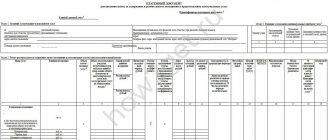Home / Real estate
Back
Published: 03/12/2020
Reading time: 10 min
0
1293
The privatization process allows housing to be transferred from state ownership to private ownership. The peak of real estate privatization occurred in the 90s, but remains available today. In 2021, this procedure remains available to Russians who live in housing provided to them under a social tenancy agreement. What are the pros and cons of real estate privatization and is it worth converting the apartment into your own property? Is it possible to deprivatize the apartment in the future?
- What is apartment privatization and why is it needed?
- Which properties does it apply to?
- Who has the right to privatize an apartment
- Dates
- Advantages and disadvantages
- The procedure for privatizing an apartment in 2021 Documents
- Definition of method
- Obtaining consent from other owners
- Step-by-step algorithm
- Cost of the procedure
- Invalidation of privatization
What is privatization and why is it needed?
Privatization is the transfer of state property into personal ownership. The property can be anything - not only an apartment or a room, but also land and non-residential premises. Thanks to privatization, the right of ownership of housing appears, which means that such property can be sold, donated, exchanged for other property, left as an inheritance or pledged to obtain a loan. Such actions cannot be performed with non-privatized property - it can only be used.
For example, if you live under a social tenancy agreement in a state or municipal apartment, you cannot dispose of it at your own discretion. If privatized, the apartment will become personal property, and it can not only be sold or bequeathed, but also used as a contribution, for example, when concluding an agreement on moving to a social shelter for the elderly or registering rent.
What housing is not subject to privatization?
Free transfer of ownership is allowed in relation to residential municipal or state real estate used under social rent.
Based on Art. 4 of Law No. 1541-1 are not subject to privatization:
- residential facilities are in disrepair;
- dorm rooms;
- apartments and houses located in closed military settlements;
- service living quarters.
The last rule does not apply to the housing stock of state farms and other agricultural enterprises.
Duration of the program
Initially, the privatization law was supposed to be in force for only a few years. However, the authorities decided to continue the bill for residents of Crimea after its union with the Russian Federation. Moreover, at first it was planned to extend the program only for those citizens who live in dilapidated houses, but then the bill was slightly modified.
Today, unfortunately, there is no exact data on whether the privatization of housing will be extended after March 1, 2021. It can be assumed that the law will be extended, at least against the backdrop of the fact that during quarantine people cannot privatize property, because isolation creates some restrictions. True, it is quite problematic to confirm this information at the moment.
This is interesting! In 2020, the President of the Russian Federation proposed to completely abolish temporary limits for free privatization of housing stock. The fact is that non-privatized apartments are a kind of ballast that is on the state budget. All expenses that appear and are required to maintain the house, as well as unpaid taxes, are a minus for the budget. According to preliminary estimates, privatized property brings about 6 billion rubles to the state budget annually, or even more. From this point of view, lifting temporary restrictions on free manipulations for the privatization of apartments is beneficial both for the population of the country and for the state.
It must be said that people who live in dilapidated houses risk sooner or later being left without any housing, because it will simply be demolished. Registration of property rights will make it possible to apply for new housing, that is, it gives the right to social guarantees from the government.
Important Rules
To figure out where to start privatizing an apartment under a social tenancy agreement, you need to understand the basic principles of this process. Certain conditions must be met and the following taken into account:
- transfer of an object into private ownership is carried out only with the consent of all persons living in the apartment (using this object);
- minors participate a priori;
- the interests of minors in interactions regarding privatization are represented by their parents as legal representatives;
- such a right can be exercised only once in a lifetime (with the exception of minors, after reaching adulthood they again acquire the right to a single privatization).
Next, we’ll figure out exactly how to privatize an apartment. Step-by-step instructions in 2021, as before, involve several stages. The most difficult of these is the stage of collecting documents.
From January 1, 2021, preferential mortgages for residents of rural areas should be available in Russia
How was the bill passed?
Draft Law No. 77072-7, proposing to make a number of changes to the Federal Law dated December 29, 2004 No. 189-FZ, was sent for consideration to the State Duma of the Russian Federation on January 13, 2017.
The text of this document, among other things, contained proposals to postpone the completion date of privatization by another two and a half years, but only for certain categories of employers. Whereas for all other persons, the deadlines for privatization of housing should have remained the same (until 03/01/2017).
After finishing the 1st reading, it was decided to make some changes to the text. 22 parliamentary amendments to the bill also spoke about softening the conditions for extending the period of free privatization. So, Sidyakin A.G. and Kachkaev P.R. suggested two alternatives:
- extend the free opportunity for privatization until 01/01/2020 for absolutely all categories of citizens;
- make the procedure indefinite.
During the discussion of the amendments, those present agreed that the second option was preferable, and a week later the final version was considered and adopted in the 2nd reading. After the 3rd reading, on February 10, 2017, the corresponding law was successfully adopted.
After 5 days, the document received approval from the Federation Council and was sent to Vladimir Vladimirovich Putin for signing. As a result, on February 22, 2017, after official publication, Federal Law No. 14-FZ dated February 22, 2017 came into force.
The essence of the procedure
Before a detailed consideration of the privatization procedure, it is necessary to understand why it is needed.
The essence of the procedure is the free transfer of property owned by the state or municipality to an individual. In Russia, the procedure for the privatization of apartments is fully regulated by Law No. 1541-1. The norms for the transfer of state property into private ownership came into force on July 4, 1991. However, the first privatizations took place only in 1992. After the final collapse of the USSR.
Throughout the life of Law No. 1541-1, the government has repeatedly attempted to introduce term limits. There have been proposals to shorten the period during which privatization would be carried out free of charge.
The first restriction dated back to 2007. Subsequently, the possibility of carrying out the procedure free of charge was extended until 2010. Afterwards the extension took place 4 more times. As a result, the deadline for free privatization was set for March 1, 2017.
However, on February 22, 2017, Law No. 14-FZ came into force. Based on it, the restrictions have completely lost their relevance.
Reference! Since 2021, an indefinite procedure for free privatization of real estate has been in effect.
Similar regulations apply in 2021. And for now it remains unchanged.
Advantages
The main advantage of privatization is the acquisition of full ownership rights to a residential property.
The owner of the apartment can dispose of it at his personal request. The owner of privatized municipal housing has the right to:
- sell;
- to rent;
- give;
- pass on by inheritance.
The owner can also register third parties on the territory of his apartment without obtaining consent from the administration.
Flaws
The disadvantages of the procedure include the need to pay property taxes after its completion.
The fee is calculated taking into account the cadastral value of the property. Another disadvantage is the transfer of responsibility for bearing expenses for the maintenance and repair of the apartment. Before privatization, repayment of expenses for these items is made from the budget of the authorities of the constituent entity of the Russian Federation.
When did it start in Russia?
In October 2001, the updated Land Code of the Russian Federation, which regulates all kinds of land legal relations, was put into effect. It is in it that it is stated (Federal Law No. 137 of October 25, 2001 and Federal Law No. 171 of June 23, 2015) that you can take possession of a land plot in two ways:
- by purchasing it;
- through the privatization of land plots on the balance sheet of the state or municipality.
It should be noted that it is possible to privatize plots that have been received for indefinite use or are in lifelong inheritance, as well as those that are gardens or country houses (the procedure for privatizing land in a garden partnership is written here). Their main difference is that in a house built on a dacha plot, a citizen has the right to register his residence.
The law prohibits registering ownership of:
- plots located in specially protected natural areas (reserves, national parks);
- lands with public facilities (parks, beach areas, etc.);
- memory books withdrawn from circulation;
- parts of the water or forest fund.
Carrying out the privatization procedure is a voluntary decision of the citizen. Thus, everyone decides for themselves - either pay rent for using the land plot, or privatize the land, pay taxes and manage the land as the rightful owner - sell, donate, transfer to the bank as collateral or leave as an inheritance.
Questions and answers
Despite all the transparency of the process of transferring state property to private property, it is still accompanied by a number of questions.
Answers to some of them are given below.
Will indefinite privatization of housing remain free after March 1, 2021?
After 03/01/2017, when Federal Law No. 14-FZ came into force, the privatization of state and municipal housing stock continues as before.
It remains free and there have been no changes to the procedure.
Land plot
Privatization of land in use became widely available in Russia in 2006.
At this time, Federal Law No. 93-FZ was adopted, which was nicknamed the “dacha amnesty.” Thanks to him, hired lands could be registered according to a simplified scheme.
- Recent changes made to this legislative act have allowed each citizen, on certain grounds, to obtain ownership of a dacha or garden plot of land.
- In addition, at the same time as the land, the buildings located on it are privatized.
The program was supposed to end by 2021, but in February 2020 it acquired indefinite status.
Are there any restrictions
There are only two strict restrictions regarding the re-registration of state property into private property:
- each citizen has the right to participate in this program only once (except for cases where the citizen participated in privatization for the first time while being a minor);
- the object that needs to be privatized is in disrepair (does not apply to cases where only major repairs are needed).
All other points are not assessed so strictly and, if particularly necessary, can be considered in court.
Reasons for refusal
The reason for refusal is usually the lack of necessary papers or their incorrect execution. Also, some papers may lose their legal force.
You cannot privatize housing even if:
- municipal authorities are not its owners;
- it is localized in a military camp;
- The apartment was remodeled without approval from the BTI.
The refusal must be provided to the applicant in writing with a precise indication of the reason.
Where to start privatizing a land plot
To begin the process of land privatization, you must first make sure that it is subject to registration as a property, and also that the ownership rights to it have not yet been formalized.
You can obtain such information by requesting an extract from the Unified State Register. Any citizen can receive an extract by paying a preliminary state fee.
If there is an opportunity to privatize a plot, then you need to initiate the process by preparing documents. Often you have to look for some papers or get them again.
The exact list may vary depending on the region, so before starting the process it is better to obtain detailed advice from the administration of the area where you live.
About quantities
According to the current rules in Russia, every citizen can privatize public housing. But only under certain circumstances. We'll look at them later.
To begin with, it is worth paying attention to one nuance. The thing is that the unlimited privatization of housing is a free procedure. But only once. You will have to pay for the privatization of the second and subsequent apartments. This is a legal requirement.
That is, the free privatization right is offered only once in a lifetime. The exception is children. If they privatized housing before reaching adulthood, then the mentioned right is reserved for them after 18 years. Such cases are not rare.
How many times can you participate in the unlimited privatization of housing? As much as you like. But you can exercise your right for free once.
Documents for privatization
The list of documents is not established in federal legislation. Each region independently approves this list.
For example, Moscow has its own administrative regulations, according to which the following documents must be provided:
- Application for the provision of public services.
- Passports of the applicant, all members of his family, as well as everyone who is registered in the privatized residential premises and has the right to use this premises on social rent terms. For children under 14 years of age, birth certificates will be required.
- Social tenancy agreement for an apartment.
- An order or an extract from an order of an executive authority. If the order is lost, you need to obtain a copy of the order of the executive authority from the archive. In Moscow, such a copy can be obtained free of charge at any MFC.
- A document confirming Russian citizenship - for children under 14 years of age. If the child’s parents are citizens of the Russian Federation and are registered in a privatized apartment, this document is not needed.
- An extract from the house register or a similar document for the period from July 21, 1991 until the moment of registration in the privatized apartment.
- A document from an authorized body confirming that the right to participate in privatization at the previous place of residence was not used, as well as a document confirming the authority of this body to issue the specified document.
- Written consent to privatization or written refusal to privatize the occupied apartment. These documents are drawn up in approved forms and must be notarized or signed in person in the presence of an MFC employee.
- Technical passport for the apartment.
- Floor plan.
- An extract from the personal account indicating everyone living in the apartment.
For certain categories - for example, military personnel, disabled people, children without parental care or from specialized institutions - additional documents will be required. For example, a notarized power of attorney, if the application and documents are submitted by a representative, or a decision of the guardianship, trusteeship and patronage authority, if the documents are submitted by the guardian of a minor. A list of other documents that may be required is contained in the administrative regulations.
Where to get documents for privatization. The application can be filled out at the place of submission - at the MFC.
Decisions of the guardianship and trusteeship authorities, court decisions and sentences, a certificate of release, a document confirming the serving of a sentence, an extract from the military personnel’s personal file are issued by the relevant authorities - guardianship and trusteeship, court, correctional institution or archive of a military unit.
A social tenancy agreement for an apartment, a warrant or an extract from an order of an executive authority must be in the hands of the social tenant. If lost, you need to contact the archive through the MFC.
Document on Russian citizenship - in the multifunctional migration center.
An extract from the house register or a similar document and an extract from the personal account - in the HOA (MC, housing cooperative, etc.) or in the MFC.
A document confirming the unused right to participate in privatization at the previous place of residence - in the local government body or technical inventory organization - BTI.
The technical passport and floor plan must be ordered from the BTI.
This is what the first page of a technical passport might look like
How long are documents valid? All documents have different validity periods. For example, an order or social rental agreement has no restrictions on its validity period. The technical passport and floor plan for the apartment are also not limited by date by law, but in practice in some regions they may be asked to update them. An extract from your personal account and a certificate of no debt on utility bills are valid for a month.
It is better to take to the MFC in advance a list of documents that are required in your region and immediately clarify the end date of their validity. This way you can figure out which documents to receive first and which ones immediately before submitting your application, so that you don’t have to request the same document several times.
Basic Rules
The procedure requires compliance with a whole list of conditions. Without their implementation, difficulties may arise with privatization.
Who can privatize housing
If we consider in detail who has the right to re-register an apartment, then the applicant must:
- Have a residence permit in a privatized home. The rule applies to all potential owners of the property.
- Rent property under a social tenancy agreement. The agreement must contain the personal signature of the applicant who initiated the procedure.
Privatization is also possible when using municipal housing under a warrant. This document was given to tenants until 2005.
According to paragraph 1 of Article 11 of Law No. 1541-1, the right to privatization can be used by a citizen only once.
The rule does not affect minors. If a child became the owner of an apartment through privatization before he turned 18, then after reaching this age he can again exercise this right.
Additional requirements
Privatization is possible if there is approval from all residents registered in the apartment. In the event that not everyone agrees, you will need to prepare a written refusal of the transaction. The document must be certified by a notary office.
Before starting the process, it is worth deciding on the distribution of living space between the owners.
Options:
- Joint ownership. Housing owners have equal rights. Any transactions are carried out by mutual consent.
- Shared ownership. The apartment is distributed among the owners on the basis of allocation of shares. The size of the latter is determined by the parties to the transaction. Each owner has the right to personally dispose of his part.
It is also possible to register an apartment for one person. However, the consent of the remaining interested parties will be required. The latter will be able to live in the housing, but the right to dispose of them will be lost.
Privatization in Russia
While in certain areas of the economy (service, trade) this problem was solved quite quickly, in industry and agriculture the desired effect was achieved much more slowly, largely due to the fact that, according to Mau, privatized enterprises became the property of labor collectives , that is, under the control - and in the future, the ownership - of their directors. However, Anatoly Chubais himself later said that privatization was carried out with the sole purpose of preventing the communists from coming to power. began after the adoption of the USSR Law “On State Enterprise (Association)” in 1988.
At this stage, it was carried out in the absence of the necessary regulatory framework.
However, its real scale remained unknown.
The Organization for Economic Co-operation and Development estimates that by the summer of 1992 (the start of the privatization program), more than 2,000 enterprises had been privatized "spontaneously".
Documents required for registration of ownership
In accordance with current legislation, privatization has become unlimited. That is, citizens have the opportunity to exercise their own rights at absolutely any time. If you prepare correctly, registering an apartment as private property will be a fairly easy procedure.
To register property rights with the Rosreestr authorities, you will need to provide the following papers:
- Old extract from the Unified State Register.
- Privatization agreement.
- Passports of people who participated in privatization.
- Statement.
Despite the apparent complexity of the issue, everything is quite simple. The main thing is to collect all the necessary papers and comply with all the conditions that allow you to privatize housing.
The adoption of the law on unlimited privatization made many residents of the country happy. Now there is no need to urgently resolve this issue - everything can be done without haste. The article examined until what year privatization can be carried out.
Need a lawyer
If you have any questions about how to properly privatize living space, contact the lawyers on our website for a free consultation. Despite the indefinite extension of free privatization, the procedure has not become any easier. It will require not only strength from you, but also significant time. Therefore, it is best to contact an experienced lawyer who, on the basis of a power of attorney, can accompany the transaction to transfer municipal property into your personal property.
- Due to constant changes in legislation, regulations and judicial practice, sometimes we do not have time to update the information on the site
- In 90% of cases, your legal problem is individual, so independent protection of rights and basic options for resolving the situation may often not be suitable and will only lead to a more complicated process!
Therefore, contact our lawyer for a FREE consultation right now and get rid of problems in the future!
Author of the article
Family law lawyer. Experience since 2010.
-free for a lawyer!
Ask a legal question and get a free consultation. We will prepare an answer within 5 minutes!
Confidentially
All data will be transmitted over a secure channel
Promptly
Fill out the form and a lawyer will contact you within 5 minutes
Rate this article
Loading…
Cost of privatization of an apartment in 2021
Privatization of housing is free of charge and is carried out free of charge. However, paperwork requires some costs, which in total can amount to a decent amount.
| State duty | 2000 rub. |
| Certificate of non-participation in privatization | for free |
| Duplicate social lease agreement | for free |
| Technical certificate | From 1000 to 10,000 rubles, depending on the region. Urgent production – 12,000 – 18,000 rubles. If an unapproved redevelopment was carried out, you will have to pay a fine of up to 15,000 rubles. |
| Extract from the Unified State Register of Real Estate | 300 rub. - for individuals, 600 - for legal entities. |
| Notary Services | If you refuse privatization, about 1000 rubles. and a power of attorney from 1000 rubles. |
In addition, notary services for certification of applications and copies of documents are also paid and paid according to established tariffs. You may have to pay for a number of additional certificates.
What and to whom can be privatized
The basic rule of privatization is that the housing that the family receives under a social tenancy agreement is transferred into ownership. This is the housing that the state provides to different categories of people in need of improved housing conditions (the list is large, the main ones are the poor who are not able to buy their own apartment).
Get housing under a social rental agreement
as a low-income family it is now very difficult (even in Moscow apartments are given to those on the waiting list who were registered in the early 90s), in other cases it is still possible:
- eviction from other social housing, which is recognized as unsafe and has been resettled;
- various social programs at the local level (providing housing for doctors, teachers, etc.);
- providing housing for orphans, etc.
As soon as housing has been received under a social tenancy agreement, you can immediately ( except for orphans)
, they will be able to do this only after 5 years).
There are several requirements for employers
who can privatize an apartment:
- citizenship of the Russian Federation;
- registration in an apartment under a social tenancy agreement (actual residence is not necessary);
- Previously, the right to free privatization was not used (by any of those who will privatize housing);
- if one of the residents does not want to participate in privatization, his refusal is required.
Housing will be transferred to the ownership of all apartment residents who have not provided a waiver of privatization, including minor children.
The situation with minors is special - they also receive a share in privatization, and it is possible not to include a child in privatization only with the permission of the guardianship authorities
(which, traditionally, they almost never give).
Therefore, an exception has been made for minors - upon reaching the age of 18, they again receive the right to privatization.
There are also several requirements
:
- the apartment has not previously been privatized and is in municipal ownership;
- the house has not been assigned emergency status;
- is not in a hostel, in a closed military city, is not a service apartment;
- does not apply to a stationary social protection institution in rural areas (boarding house).
In addition, in some cases the authorities do not give consent to the privatization of apartments in buildings of cultural or historical value
. There is no direct ban on the privatization of such housing, but refusals do occur.
Why can they refuse?
Some Russians are faced with refusal to carry out privatization. This is possible in the following situations:
- the documents provided contain false information or are compiled incorrectly;
- real estate cannot be privatized in accordance with the law;
- the housing was subject to redevelopment or reconstruction that was not legalized;
- the applicant does not have permanent registration in the privatization object or he only rents living space;
- the citizen is already the owner of some other home and tried to hide this fact.
The applicant from the MFC will receive a reasoned refusal to carry out the procedure for transfer of ownership. The reason will be clear from it. If it is not legal, then the citizen can go to court and challenge it.
Procedure
A law allowing the indefinite privatization of housing has been adopted. However, it had absolutely no impact on the project implementation algorithm. So, a person will have to adhere to the following procedure for privatizing housing:
- Prepare a package of certain documents. The papers that will be required to exercise the right to privatization will be described below.
- Fill out an application, the form of which is established by law.
- Visit the city administration, in particular the department dealing with housing issues, and submit a corresponding request.
- Wait for an answer.
- Draw up and conclude a privatization agreement. Usually, simply signing the relevant agreement is sufficient.
- Contact Rosreestr and register your ownership.
After all actions are completed, people who took part in privatization receive housing or part of it as their own. As a rule, property is divided into equal shares. That is, the property will be common. To allocate part of the housing, it is recommended to immediately contact the judicial authorities.
Features of privatization with several owners
In practice, a situation often arises when a house is owned by two or even more owners. In this case, the privatization procedure occurs in the following order. An application for obtaining land ownership rights is submitted by one of the owners. The second is documenting consent to this. After approval from the municipality, the land plot is divided in proportion to the shares in the house, which is documented by a cadastral engineer. Each owner is responsible for registering ownership rights to their plot independently.
If the consent of the second owner for privatization is not obtained, an appeal to the court will be required. This leads to a significant delay in the process, and a positive decision from the judge is not guaranteed. Therefore, it is much easier and more correct to reach an agreement with all home owners.
Where to contact
During the transfer of state real estate to private ownership, you will have to visit several institutions and organizations:
- Local administration. Here you can fill out an application for participation in the privatization program, as well as receive a settlement order or a social rent agreement.
- MFC (multifunctional center). Employees of the organization can prepare a certificate of family composition and make an extract from the house register. You can also submit an application for privatization at the MFC branch at your place of residence.
- Housing Department. The institution deals with the issue of registration and signing of privatization agreements.
- Rosreestr. Responsible for providing extracts from the Unified State Register and cadastral passports.
- BTI (Bureau of Technical Inventory). Examines housing for illegal alterations, and, if necessary, draws up a technical passport for the property.
Usually this is quite enough for successful registration of ownership.
The legislative framework
The main law regulating the process of simplified transfer of state property into private property is the Law “On Dacha Amnesty” (Federal Law No. 93-FZ) and the preceding Federal Law No. 122-FZ of June 17, 1997.
Changes dated June 30, 2006, recorded in No. 93-FZ, regulate the main points of transferring the site and buildings on it to private ownership.
Changes in the legislative framework in 2021 affected the extension of the program until 2019 (for residential buildings) and until 2021 (for plots).
The meaning and advantages of privatization
Privatization is the transfer of housing from state or municipal property to private property. People live in such apartments under a rental agreement, but are not legally considered owners.
This leads to the disadvantages of non-privatized housing; it cannot be:
- give and inherit even to family members, but after death relatives can draw up a separate agreement;
- exchange without the owner's consent and mortgage;
- redevelop or convert into commercial real estate.
Selling an apartment without privatization will also not work, nor will it be possible to exchange it for another. You cannot register other people in it without the approval of the municipality.
The only plus is that you don’t have to pay property taxes and contributions for major repairs. But the risk of being evicted at any moment is largely eliminated. Utility bills have to be paid in any case.
The procedure for transferring apartments into private hands was determined by the Law of the Russian Federation No. 1541-1 “On the privatization of housing stock in the Russian Federation” dated July 4, 1991. According to the law, citizens can receive housing ownership free of charge and regardless of age.
Previously, it was planned to make the procedure paid, but the authorities abandoned these plans and abolished the time limits. Therefore, in 2021 everything remains unchanged, and there is no need to rush into registration.










